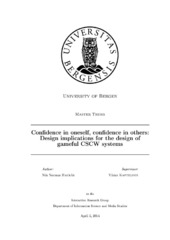Confidence in oneself, confidence in others: Design implications for the design of gameful CSCW systems
Master thesis
Permanent lenke
http://hdl.handle.net/1956/8658Utgivelsesdato
2014-04-05Metadata
Vis full innførselSamlinger
Sammendrag
Disentangling the intricacies of digitally supporting collaboration remains a challenge. It's a challenge which the field of Computer Supported Collaborative Work have been tackling for decades and where they've argued that collaboration might be supported without socio-economic or psychological considerations (Schmidt, 2011). In contrast, the rise of massively multiplayer online role playing games represent collaborative platforms where their collaborative dynamics are largely driven by players' emotions. Adding to that we find that the concepts of gamification or the less loaded term gameful design are increasingly being hailed as the magic bullet for getting people to act in some desired way (Kumar and Herger, 2013). McGonigal (2011a) however, argue that we need to think beyond the bells and whistles of points and badges to how gameful design may enrich interaction by empowering users. This thesis presents qualitative design research in creating a gameful CSCW system inspired by the free-flowing collaborative play seen in games like World of Warcraft (Nardi and Harris, 2006). A conceptual framework was developed and implemented as a high-fidelity prototype called Looking for Group (LFG). Focus groups were recruited from two Communities of Practice to give feedback on the LFG prototype. Three hours worth of focus group interviews were transcribed, analyzed and discussed in order to develop both theoretical implications and design implications regarding the design of gameful CSCW systems. Ultimately, we argue that confidence might be an important prerequisite to collaboration, and that gameful design might be an effective tool for creating an environment in which confidence may thrive.
